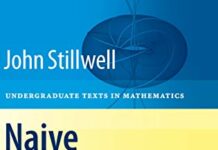
Ebook Info
- Published: 2016
- Number of pages: 440 pages
- Format: PDF
- File Size: 4.41 MB
- Authors: John Stillwell
Description
An exciting look at the world of elementary mathematicsElements of Mathematics takes readers on a fascinating tour that begins in elementary mathematics—but, as John Stillwell shows, this subject is not as elementary or straightforward as one might think. Not all topics that are part of today’s elementary mathematics were always considered as such, and great mathematical advances and discoveries had to occur in order for certain subjects to become “elementary.” Stillwell examines elementary mathematics from a distinctive twenty-first-century viewpoint and describes not only the beauty and scope of the discipline, but also its limits.From Gaussian integers to propositional logic, Stillwell delves into arithmetic, computation, algebra, geometry, calculus, combinatorics, probability, and logic. He discusses how each area ties into more advanced topics to build mathematics as a whole. Through a rich collection of basic principles, vivid examples, and interesting problems, Stillwell demonstrates that elementary mathematics becomes advanced with the intervention of infinity. Infinity has been observed throughout mathematical history, but the recent development of “reverse mathematics” confirms that infinity is essential for proving well-known theorems, and helps to determine the nature, contours, and borders of elementary mathematics.Elements of Mathematics gives readers, from high school students to professional mathematicians, the highlights of elementary mathematics and glimpses of the parts of math beyond its boundaries.
User’s Reviews
Reviews from Amazon users which were colected at the time this book was published on the website:
⭐Elements of Mathematics, is an overview of what the author believes is elementary mathematics. An expansion on topics from Elements of course. It covers a wide range of topics which the author believes are approachable without having advanced mathematical training. What is considered elementary is different than what is considered easy and as such this book contains some deep and non-trivial ideas. I typically like the writing of Stillwell on mathematics and have several textbooks by him. Elements certainly has some good writing on interesting topics but i am not sure who the intended audience is.Stillwell divides the book into 10 chapters with 8 subjects that are covered at an ‘elementary’ level with the final chapter introducing more advanced mathematics. Topics included are arithmetic, algebra, geometry, calculus(analysis), combinatorics, probability, logic and computation. All of these topics can be approached by a multitude of readers and some of the material can be seen as re-hashed from other works by the author (namely History of Mathematics, road to infinity etc). The writing is quite approachable but there are undoubtedly some materials meant for other mathematicians and not a real overview of elementary topics. A proof of Brouwer’s Fixed Point Theorem using some graph theory is interesting but isoteric and to me more the author showing his breath of knowledge than writing a consistent book. I liked parts of each chapter but there are multiple topics that are introduced only in undergraduate math classes and then only superficially begging what was the point and who is the intended audience. It would be better to have focused in algebra on polynomials and groups than getting into number fields as vector spaces. Its certainly understandable to those that know abstract algebra, I would find it annoying and arrogant if i was the described audience. All in all there are segments for a wide array of readers and many people can get interesting snippets in many places. The writing is usually clear, though at times a bit too concise.Elements of Mathematics is a nice book with an overview of a lot of mathematical topics that come about in an undergraduate education and some topics that are introduced in high school. The coverage is largely undergraduate in level and with a more casual tone of a typical theorem-proof book. It does include proofs but doesn’t explore topics with real depth though does have a lot of breadth. If one is trying to teach some of these subjects this author gives a potential way of describing some concepts and if one wants to re-familiarize oneself with some foundational math concepts this is a good book. If one wants to learn math I am a skeptic this is a great resource.
⭐Like all books from Stillwell, it is a well structured and written book with a treasure trove of things. I teach a course “teaching math from a historical perspective” now for the 8th time which has a similar scope: a panoramic view over many different topics in math. I had used an other book from Stillwell (mathematics and its history) before for that class. The “elements” would be even better suited. Every chapter finishes with a section on “philosophical remarks” and a section with “historical remarks”. Part of the book goes further than any other book for a more general audience: examples are “reverse mathematics” or the “Koenig infinity lemma”. The book will definitely enrich any course with a broader scope.
⭐this book provides an advanced discussion about elementary mathematics.-Primarily, the author has tried to partition math into two buckets-elementary vs. advanced.-Secondly, uncovers known and hidden linkages connecting different branches of math. -Third, every chapter ends with a historic overview.Pretty solid and comprehensive on all three counts. Great read for anyone trying to do a full review of all their math education and gain a lot of new insights as well.
⭐As someone who has taken many advanced calculus and introductory probability courses many years ago, I found the coverage of these and related subjects and of Euclid’s Elements quite good. In several cases, particularly infinite series, the book clarified some mysteries I never did understand as a student.On the negative side, I fault the book format, i.e., being an image of pages and not a digital Kindle, made reading very difficult at times. In particular figures were often discussed on one or rwo pages prior. Plus the author’s use of notation sometimes assumed the reader was reading the book in one or two sittings — not the case for me.
⭐This is a great introduction to central issues in core areas of elementary mathematics, and the ties that connect them. Stillwell doesn’t dumb things down; while eminently readable, this book gets into the weeds of formalism and proof quite quickly. There is content of value even for people with more advanced mathematical background; in particular, I found Stillwell’s musing on the division between elementary and advanced mathematics quite illuminating. Especially appreciated are the remarks on historical and philosophical matters that Stillwell uses to contextualize otherwise highly abstract areas in mathematics.
⭐A great read for math!
⭐As with all of Stillwell’s books, beautifully written, with great clarity, and lovely choice of examples.
⭐I should say that the stars here are based on my personal experience, the book may deserve more stars on its merits and beyond my little ripple of an experience. In short, this was more advanced than anticipated, I had to put it down rather early. And I am the kind of guy that bought this book for a pleasure read, which tells you something. From the reviews, I was given the impression that a high school mathematics education would be adequate for the read, and though I have had more than that, and use statistics on occasion in my work, I found this rather impenetrable as a leisure read. Just wanted to get out a warning shot to those who might be in my shoes and considering the purchase.
⭐excellent
⭐Stillwell has succeeded at spanning an impressive spectrum of mathematical subjects, while starting from the simple — almost simplistic — aspects, up to the quite abstract, in each case… All written in modern terms and in the vein of Klein’s fundamental trilogy ” Elementary Mathematics from an Advanced Standpoint” (see my corresponding reviews).To the exclusion of sections 10.2 and 10.4, the book is excellent for self-study. Unfortunately, one can’t say the same for his latest “Reverse Mathematics” (See my corresponding review).
⭐As an ex-professional engineer who spent most of my career in IT and was steeped in Numerical Analysis, differential equations and matrix theory up to tensors. I found this book surprisingly heavy going. I have Euclid, Hofstadter’s book on Godel, several books on fractals and Devlin’s “Mathematics the New Golden Age” all of which I found easier.
⭐O livro é bom o que não gosatei foi a demora em recebe-lo.Eu já tinha referencias boas a respeito da obra
⭐
⭐Very interesting book ! Mathematics notions are well explained.If you’re interested in maths, then you need it ! M
⭐
Keywords
Free Download Elements of Mathematics: From Euclid to Gödel in PDF format
Elements of Mathematics: From Euclid to Gödel PDF Free Download
Download Elements of Mathematics: From Euclid to Gödel 2016 PDF Free
Elements of Mathematics: From Euclid to Gödel 2016 PDF Free Download
Download Elements of Mathematics: From Euclid to Gödel PDF
Free Download Ebook Elements of Mathematics: From Euclid to Gödel



